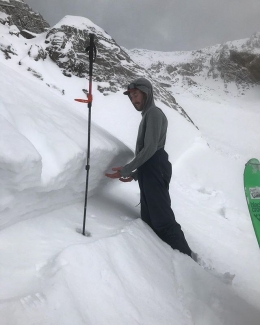Good Morning. This is Doug Chabot with pre-season avalanche, weather, and event information from the Gallatin National Forest Avalanche Center on Saturday, November 3rd. This information is sponsored by The Friends of the Avalanche Center and all those who celebrated at last night’s ULLR Festival! This bulletin will be updated Monday morning. Ski areas are not conducting avalanche control and Big Sky does not allow uphill travel.
In the last 24 hours 2-5” of snow fell at high elevations. Rain was reported below 8000’ so exact snowfall amounts are unknown. Regardless, precipitation fell and westerly winds blew 25-30 mph with gusts of 60 mph. Winds have calmed this morning to 15-30 mph and snowfall has tapered. Temperatures are in the mid 20’s F and should remain below freezing through the weekend. Expect scattered snowfall today with the storm kicking into high gear Sunday morning and dropping a total of 12-16” by early Monday.
We will update our weather and avalanche log and regional pages daily.
The season’s first avalanches were reported yesterday. The Big Couloir at Big Sky slid for a long distance (report) and many avalanches were seen in the Bridger Range (report). Near ridgetops 1-2’ of snow has fallen since Wednesday and yesterday the winds blew strong out of the west loading many slopes. Natural avalanches occurred and more snow today and tomorrow guarantees more avalanches.
I get it. Everyone is itching to get out skiing, and you can, but it requires careful route finding and assessment to pull it off safely. Some rules of thumb:
- Steep slopes, especially those wind-drifted, should be avoided.
- Rocks and other obstacles are hidden under the thin snow and will injure or kill you if you are caught in a slide.
- Carry all your rescue gear (beacon, shovel, probe) and also all your normal protective gear (helmet, airbag, etc). Carry the same gear today that you carry in January. Early season is not a time to be lazy because avalanches don’t know it is early season.
- Travel one at a time in avalanche terrain.
- Take an avalanche class (schedule).
Climbers searching high elevation ice, like on the Sphinx, are especially vulnerable this weekend since it’s near impossible to avoid avalanche terrain.
Hunters are not immune to slides. Crossing snow filled gullies can be treacherous so avoid them completely or cross one at a time with a partner watching. If you are solo, be extra careful.
Skiers, climbers and hunters have all been killed by early season avalanches in southwest Montana. Temper your enthusiasm and be extra wary. Let’s face it, we are all a bit rusty in snowpack evaluation, rescue, and winter travel.
To sharpen the mind I recommend reading this accident report from October 2012 in the northern Bridger Range, and this report from the tragic accident last October on Imp Peak.
We are preparing for winter, scheduling avalanche classes, and setting up weather stations. If you get outside send us an observation via our website, email (mtavalanche@gmail.com), phone (406-587-6984), or Instagram (#gnfacobs).
Upcoming Avalanche Education and Events
Our education calendar is full of awareness lectures and field courses. Check it out: Events and Education Calendar.
November 6, 1-hr Avalanche Awareness, 6-7pm at Roskie Hall at MSU
November 7, 1-hr Avalanche Awareness, 6-7pm at REI Bozeman
November 8, 1-hr Avalanche Awareness, 6-7pm at Langford Hall at MSU
November 8, 1-hr Side-country Avalanche Awareness, 6-7pm at PHD Skis
November 14, 1-hr Avalanche Awareness, 6-7pm at Spire Climbing Center
November 26, MSU Snow and Avalanche Workshop, 5-9pm at MSU SUB Ballroom A
Novembeer 29, 30 and Dec 1, 2or 8, Intro to Avalanche w/ Field Day, more info here
Every Friday and Saturday in Cooke City starting November 23 and 24, Free Rescue training and Snowpack update, exact locations TBD
To prepare yourself for a safe winter in the backcountry you can read this accident report from October 2012 in the northern Bridger Range, and plan to attend one of our avalanche education courses listed HERE.


